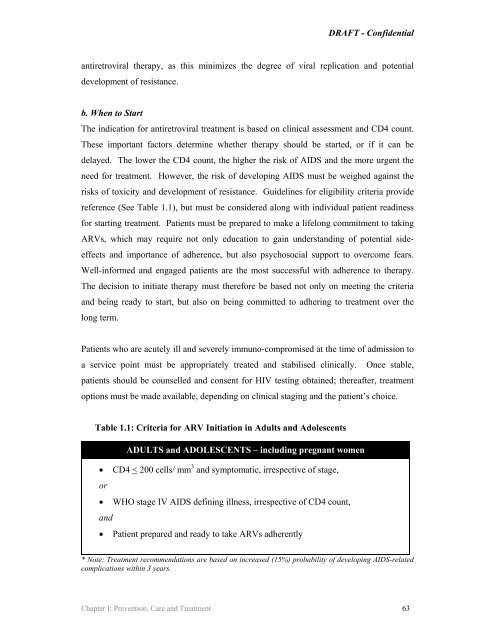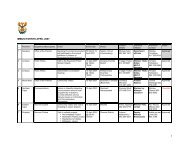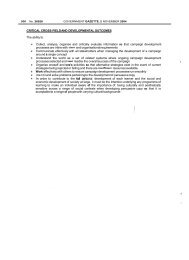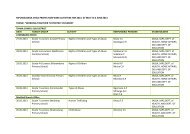Operational plan for comprehensive HIV and AIDS care and ...
Operational plan for comprehensive HIV and AIDS care and ...
Operational plan for comprehensive HIV and AIDS care and ...
Create successful ePaper yourself
Turn your PDF publications into a flip-book with our unique Google optimized e-Paper software.
DRAFT - Confidential<br />
antiretroviral therapy, as this minimizes the degree of viral replication <strong>and</strong> potential<br />
development of resistance.<br />
b. When to Start<br />
The indication <strong>for</strong> antiretroviral treatment is based on clinical assessment <strong>and</strong> CD4 count.<br />
These important factors determine whether therapy should be started, or if it can be<br />
delayed. The lower the CD4 count, the higher the risk of <strong>AIDS</strong> <strong>and</strong> the more urgent the<br />
need <strong>for</strong> treatment. However, the risk of developing <strong>AIDS</strong> must be weighed against the<br />
risks of toxicity <strong>and</strong> development of resistance. Guidelines <strong>for</strong> eligibility criteria provide<br />
reference (See Table 1.1), but must be considered along with individual patient readiness<br />
<strong>for</strong> starting treatment. Patients must be prepared to make a lifelong commitment to taking<br />
ARVs, which may require not only education to gain underst<strong>and</strong>ing of potential sideeffects<br />
<strong>and</strong> importance of adherence, but also psychosocial support to overcome fears.<br />
Well-in<strong>for</strong>med <strong>and</strong> engaged patients are the most successful with adherence to therapy.<br />
The decision to initiate therapy must there<strong>for</strong>e be based not only on meeting the criteria<br />
<strong>and</strong> being ready to start, but also on being committed to adhering to treatment over the<br />
long term.<br />
Patients who are acutely ill <strong>and</strong> severely immuno-compromised at the time of admission to<br />
a service point must be appropriately treated <strong>and</strong> stabilised clinically. Once stable,<br />
patients should be counselled <strong>and</strong> consent <strong>for</strong> <strong>HIV</strong> testing obtained; thereafter, treatment<br />
options must be made available, depending on clinical staging <strong>and</strong> the patient’s choice.<br />
Table 1.1: Criteria <strong>for</strong> ARV Initiation in Adults <strong>and</strong> Adolescents<br />
ADULTS <strong>and</strong> ADOLESCENTS – including pregnant women<br />
• CD4 < 200 cells/ mm 3 <strong>and</strong> symptomatic, irrespective of stage,<br />
or<br />
• WHO stage IV <strong>AIDS</strong> defining illness, irrespective of CD4 count,<br />
<strong>and</strong><br />
• Patient prepared <strong>and</strong> ready to take ARVs adherently<br />
* Note: Treatment recommendations are based on increased (15%) probability of developing <strong>AIDS</strong>-related<br />
complications within 3 years.<br />
Chapter I: Prevention, Care <strong>and</strong> Treatment 63
















